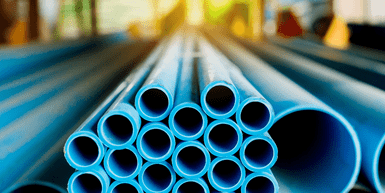Posted by Farco Plastics on 17th Jul 2023
The Evolution of Plastics

From Nylon to Industrial Marvels
In the ever-changing landscape of materials, few substances have had as significant an impact on our daily lives as plastics. These versatile and synthetic compounds have become an integral part of modern industry and have revolutionized the way we live, work, and interact with the world around us. In this article, we will delve into the history of plastics, starting from the discovery of Nylon, and explore how industrial plastics have become indispensable assets, benefiting the world in numerous ways.
The Birth of Nylon: A Revolutionary Breakthrough
In the late 1920s, a groundbreaking discovery was made by the brilliant minds of Wallace Carothers and his team at DuPont. They successfully synthesized Nylon, the world's first fully synthetic fiber. This remarkable achievement marked the beginning of the modern plastics era, showcasing the potential of these engineered materials to replace traditional resources like silk and wool.
World War II and the Plastics Revolution
The outbreak of World War II saw a dramatic shift in the demand for advanced materials. Plastics played a crucial role during the war, as they were used extensively in military equipment, aircraft components, and communication devices. The war effort not only accelerated the production of Nylon but also spurred the development of other plastics that would shape the future of industrial applications.
The Post-War Boom: Plastic Becomes Ubiquitous
After the war, the widespread availability of plastics ushered in an era of unprecedented industrial growth and consumer revolution. The convenience, durability, and versatility of plastics made them highly sought-after commodities in various sectors, from automotive to electronics, forever changing the way products were designed and manufactured.
A Spectrum of Industrial Plastics
With time, engineers and scientists developed a wide array of industrial plastics, each tailored to meet specific needs and challenges. Polycarbonate, polyethylene, polypropylene, and PVC are just a few examples of these synthetic wonders that have contributed significantly to advancements in medicine, construction, packaging, and more.
Plastics Paving the Way for Sustainability
While plastics have undeniably transformed industries, they have also faced scrutiny for their impact on the environment. However, the plastics industry has been actively responding to these concerns, driving innovations in sustainable plastics and recycling technologies. These initiatives are gradually paving the way towards a greener and more eco-friendly future.
Plastics and Transportation: Redefining Mobility
The automotive sector has embraced plastics with open arms, as they offer a lightweight alternative to traditional materials, reducing fuel consumption and emissions. From interior trims to structural components, plastics are reshaping the transportation landscape, driving innovation in electric and autonomous vehicles.
A Journey through Packaging Innovations
The world of packaging has witnessed a transformative shift with the advent of industrial plastics. From food preservation to logistics, plastics have improved shelf life, reduced waste, and facilitated safer transport, making them indispensable in the global supply chain.
Empowering Construction with Plastics
The construction industry has embraced the use of plastics for their durability, flexibility, and insulating properties. From pipes to insulation materials, plastics have found their way into our homes, enhancing comfort and energy efficiency.
Plastics in Electronics: Powering the Digital Age
The electronics sector owes much of its growth to the miniaturization and performance enhancement made possible by industrial plastics. These materials have enabled the creation of sleek and efficient devices, powering the digital revolution we experience today.
Future Prospects: Advancing the Realm of Possibilities
As technology and innovation continue to progress, so will the potential of industrial plastics. Research into biodegradable plastics, nanocomposites, and other cutting-edge materials holds the promise of even greater advancements, with the potential to revolutionize industries once again.
Conclusion: The Endless Versatility of Industrial Plastics
The journey of plastics, beginning with the revolutionary Nylon, has been a remarkable one. From their origins in World War II to their dominance in almost every aspect of modern life, industrial plastics have shaped our world like few other materials. By embracing sustainability, harnessing their unique properties, and pushing the boundaries of innovation, these synthetic marvels continue to benefit our society in ways we could have never imagined.
FAQs: Frequently Asked Questions
- Are all plastics harmful to the environment?
- While some plastics can have a negative environmental impact, the plastics industry is actively working on developing more sustainable and biodegradable alternatives.
- How has the plastics industry responded to environmental concerns?
- The plastics industry has invested in research and development of sustainable plastics, recycling technologies, and waste management initiatives to mitigate its environmental footprint.
- What are some groundbreaking applications of industrial plastics?
- Industrial plastics are used in a wide range of applications, including aerospace technology, medical devices, automotive components, electronics, and agriculture.
- How do plastics contribute to reducing carbon emissions in transportation?
- Plastics' lightweight properties enable vehicles to consume less fuel, resulting in reduced carbon emissions and improved overall efficiency.
- What role do plastics play in the modern healthcare industry?
- Plastics are crucial in the production of medical devices, equipment, and packaging, enabling safer and more efficient healthcare practices.
In conclusion, industrial plastics have emerged as indispensable materials that have significantly shaped the world we live in today. From their humble beginnings with Nylon to the vast array of applications across industries, these versatile materials continue to push the boundaries of innovation, promising a brighter and more sustainable future

